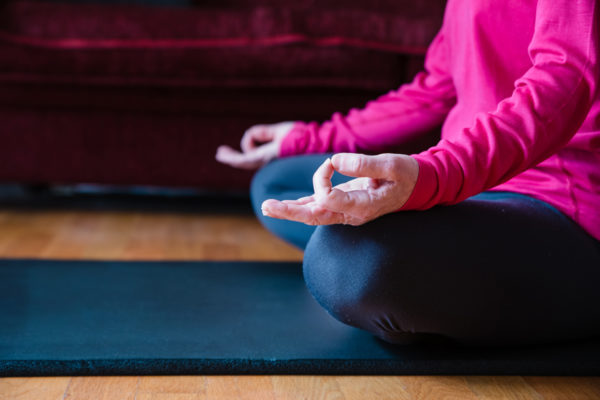Rethinking Health Challenges, Resilience, and Wellbeing
6 Practical Ideas to Inspire the Health Within You
“Resilience is the key to a well-lived life.”
― Eric Greitens
In a “Flourishing in the Second Half of Life” class I facilitate, we discussed rethinking possibilities for health and wellbeing. Someone asked, “What about chronic illness?” This is a question that many of us prefer not to think about. And while not all of us will confront chronic illness, many of us will face health and wellbeing challenges during our lifetimes.
The World Health Organization constitution states: “Health is a state of complete positive physical, mental, and social well-being and not merely the absence of disease or infirmity” (2018).
One thing I’ve learned through my own experiences is not to take life force energies for granted. The capacity to look at our lives, our lifespans, and our finite existence is one of the factors that differentiates humans from other species. Being able to recognize and be awed by the elegance of our lifeforce offers choices for understanding and navigating day-to-day experience.
Our thoughts, beliefs, expectations, and actions are important components of wellbeing and health. Harvard professor and cardiologist, Herbert Benson, MD, founder of the Mind/Body Medical Institute at Massachusetts General Hospital, points out the interconnections between mind-body-spirit and health. Benson calls this remembered wellness – the potential contributions to health that stem from awakening to the original state of wellbeing that is fundamental to our existence (1995; 1996).
Positive psychology studies the factors that contribute to a healthy, thriving life. In 2008, Martin Seligman, PhD, a leader in positive psychology, proposed a new field – Positive Health – focusing on enhancing health to increase well-being, impact better outcomes from illness, and decrease health costs (Seligman, 2008). In a review of positive psychology interventions in chronic physical illness, Ghosh and Deb write (2016) “positive health focuses on enhancing health along with curing illness to bring about wellbeing.” While the evidence is not conclusive that positive psychology interventions can lead to better health outcomes, these strategies may influence people to think, feel, and behave in more positive and healthy ways (Park, Peterson and colleagues, 2014).
💭 Remember Who You Are
More than a century ago, the first osteopathic physician, A.T. Still, founder of osteopathic medicine, declared “To find the health should be the object of the doctor. Anyone can find the disease” (A.T. Still 1892, in Lee, 2005).
I interviewed Bernadette Goheen Kohn, DO, an osteopathic physician and assistant professor at Chicago College of Osteopathic Medicine, about health and health challenges. “Remember who you are,” says Dr. Kohn. Noting that no matter the physical condition, she says we all need to remember that we are not an illness or a diagnosis … We are mind, body, and spirit (triune) … It’s important to keep in mind that the body inherently repairs, maintains, and heals from within.”
These integrated approaches are reminders that we are powerful partners in creating and optimizing our own wellbeing.
How can you take a more active role to promote your health and confront health challenges as they may arise?
6 ways to inspire greater resilience, positive health, and wellbeing. These ideas are merely suggestions. You are your own guide:
1. Learn about positive health practices to promote greater health, wellbeing, and resilience, and to help you optimize medicine and medical procedures during health challenges. For example: Read information from reliable sources. Talk to friends and experts about pro-health habits and self-care practices, such as proper nutrition, meditation, relaxation, physical activity, good sleeping habits, and positive psychology strategies.
2. When it comes to behavior change, once is usually not enough. Sustained, repeated practice of positive habits and lifestyle changes are more likely to produce positive outcomes than single, one-shot efforts (Park et al, 2014). Experiment with positive health behaviors, habits, and changes. Then stick with those that work for you.
3. Pay attention to and advocate for your own health and wellbeing. Listen to your body. You might choose to consult with professionals. For example, physicians (DO’s, MD’s), integrative/holistic physicians, nutritionists, naturopaths, physical therapists, occupational therapists, psychotherapists, health coaches, exercise trainers, acupuncturists, mindfulness coaches, yoga teachers.
4. The benefits of mindfulness can be transformative. Mindfulness and training in meditation are linked to improvements in health (Park et al, 2014; Davidson, RJ, Kabat-Zinn, J., Schumacher, J. et al, 2003). In his book, The Relaxation Response (2000), Benson explains how meditation can reduce the stress reaction, contributing to improving wellness.
You can find links to newsletters and resources on mindfulness on my website.
5. Notice, acknowledge, and write about positive things and events. This simple process that positive psychology researchers call savoring can improve wellbeing. Savoring involves noticing and thinking about even the simplest positives. Writing about the positives in your life or what you’re thankful for offers a structure to help you pause, notice, and focus on what brings you joy and meaning (Ghosh & Deb, 2017; Seligman, 2011; Lyubomirsky, 2008).
6. Create space to explore your spirit and spirituality. We humans possess a reservoir of spirit, life-force, and remembered wellness to tap into. Spirituality is a universal theme that crosses time and cultures and can offer powerful, transformational possibilities. Spirituality can help us build resilience during stressful situations, and stimulate a sense of meaning and purpose, hope, and wellbeing (Bozek, et al, 2020; Fallah, et al 2011; Benson, 1996). Consider practices such as prayer, contemplation, meditation, singing, chanting, spiritual direction, or becoming involved in a spiritual community.
What are your next steps toward strengthening the health within you?
Send your comments and suggestions to Ilene!
Click here to send Ilene an email with your thoughts about this blog post.
References:
- Benson, H. (2000). The relaxation response. New York, NY: Avon.
- Benson, H. (1996). Timeless healing: The power and biology of belief. New York, NY: Scribner.
- Benson, H. & Friedman, R. (1996). Harnessing the power of the placebo effect and renaming it remembered wellness. Annual Review of Medicine-Selected Topics in the Clinical Sciences, 47, 193-200.
- Bożek, A., Nowak, P. F., & Blukacz, M. (2020). The relationship between spirituality into a group psychotherapy program for women surviving from breast cancer. Frontiers in Psychology, 11, 1997.
- Davidson, RJ, Kabat-Zinn, J., Schumacher, J. et al (2003). Alterations in brain and immune function produced by mindfulness meditation Psychosomatic Medicine, 2006(65), 564-570.
- Fallah, R., Golzari, M., Dastani, M., & Akbari, M. E. (2011). Integrating spirituality into a group psychotherapy program for women surviving from breast cancer Iranian Journal of Cancer Prevention, 4(3), 141.
- Greitens, E. (2015). Hard-won wisdom. Boston, MA: Houghton Mifflin Harcourt.
- Goleman, D., & Davidson, R. J. (2017). Altered traits: Science reveals how meditation changes your mind, brain, and body. New York, NY: Penguin.
- Ghosh, A., & Deb, A. (2017). Positive psychology interventions for chronic physical illnesses: A systematic review. Psychological Studies, 62(3), 213-232.
- Lee, R.P. (2005). Interface: Mechanisms of spirit in osteopathy. Portland, Oregon: Stillness Press.
- Lyubomirsky, S. (2008). The how of happiness: A scientific approach to getting the life you want. New York, NY: Penguin Press.
- Park, N., Peterson, C., Szvarca, D., Vander Molen, R. J., Kim, E. S., & Collon, K. (2016). Positive psychology and physical health: Research and applications. American journal of lifestyle medicine, 10(3), 200-206.
- Seligman, M.E.P. (2008). Positive health. Applied Psychology: An International Review. 57, 3-18.
- World Health Organization (2018). Mental health: strengthening our response.
Copyright © 2021 Ilene Berns-Zare, LLC, All Rights Reserved
Ilene is a Featured Author on PsychologyToday!
Read her blog series Flourish and Thrive: Navigating transitions with mindfulness and resilience.

How are you practicing positive health?
Tap into your strengths, purpose, and potential to flourish in life and work.
If you’d like to discuss how Ilene Berns-Zare Coaching can help you achieve your goals, Contact Ilene.
Coaching with Ilene Can Help You Call Yourself to Action
Ilene Berns-Zare, PsyD, PCC, CMC (ICF Credentialed) is an Executive and Personal Coach and Speaker. Ilene helps people live their best personal and professional lives by bringing mind, body, and spirit into flow with strengths, purpose, and potential. She inspires clients to find fresh perspectives and access their full potential as creative, resourceful, whole persons. Find Ilene online, set up a free discovery coaching consultation, and access free resources at https://ibzcoaching.com/.
Please share this blog with anyone who might be interested in reading it!
We would love to hear from you! We are interested in your suggestions for this newsletter, your reactions to this one, or providing more information about coaching.




